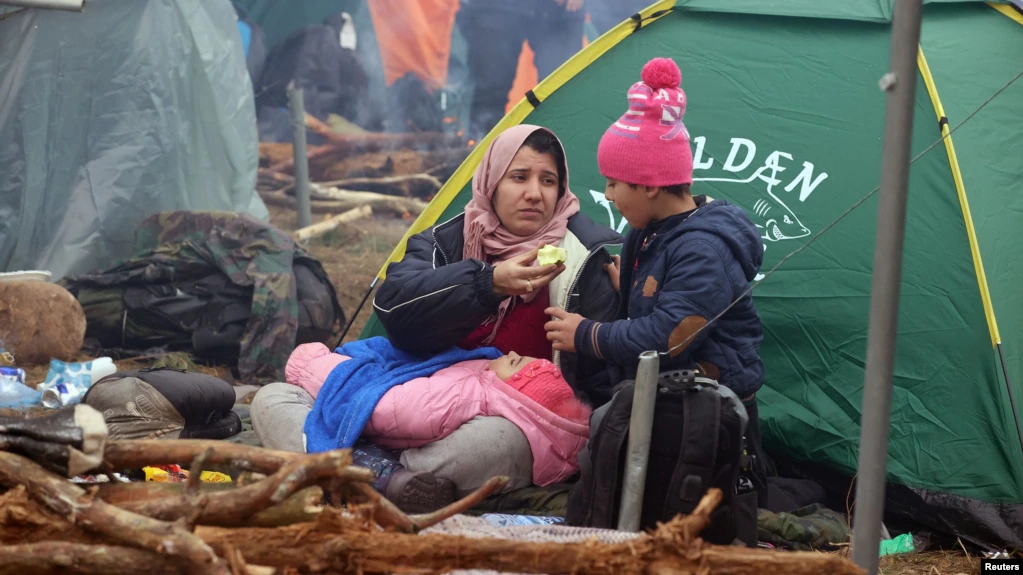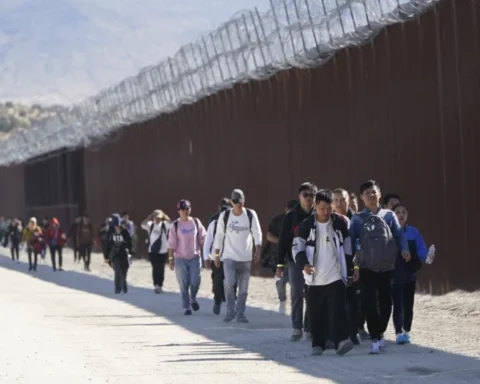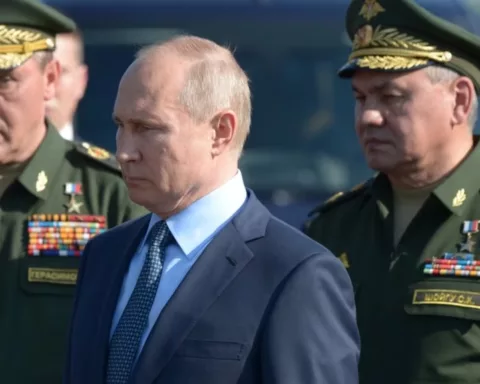Hundreds of migrants have massed outdoors in freezing temperatures along a razor-wire border between Belarus and Poland, as thousands of Polish border guards sought to block their entry into the European Union member state.
Polish radio RMF reported on November 10 that around 200 people had tried to breach the border a day earlier, and a second group of around 60 people tried after midnight.
Polish authorities say they have detained dozens who forced their way across its eastern border with Belarus. And defense officials accused Belarusian police of firing shots into the air, in an apparent attempt to frighten migrants and push them toward the border.
EU ambassadors agreed to broaden sanctions against Belarus in punishment for the migrant crisis. And German Chancellor Angela Merkel telephoned Russian President Vladimir Putin on November 10, to ask him to use his influence with Belarusian leader Alyaksandr Lukashenka.
Merkel told Putin that “the instrumentalization of migrants by the Belarusian regime is inhumane and unacceptable,” her spokesman Steffen Seibert tweeted. She asked Putin “to influence it.”
The Kremlin issued a separate statement quoting Putin as saying the EU should engage in “direct contacts” with Minsk on the matter.
The influx of migrants to Belarus has been building for several months, with thousands of people from the Middle East, South Asia, and Africa trying to illegally enter Poland, as well as fellow EU members Latvia and Lithuania.
The EU has accused Lukashenka of flying in migrants and funneling them to the bloc’s borders to retaliate against Brussels for sanctions imposed after last year’s disputed presidential election.
Lukashenka’s government, which is backed by Russia, denies the EU charges and has accused Poland and the EU of violating human rights by refusing to allow the migrants to apply for asylum.
The Russian and Belarusian militaries share close ties, as do the two countries’ intelligence and security services. The two militaries also hold regular joint exercises that in the past have included units deploying to the border with Poland, a member of NATO.
In what was a rare show of force, Russia on November 10 sent two nuclear-capable bomber aircraft flying over Belarusian airspace, a signal aimed at Poland and its NATO allies.
Moscow has also pushed for closer integration with Minsk for years, something that Lukashenka has resisted.
Local Polish police officials said on November 10 that authorities had detained more than 50 people near Bialowieza, less than 2 kilometers from the border, over the previous 24 hours. Two separate groups of people were involved.
“It was an uneasy night along the Polish-Belarusian border. There were several attempts to illegally cross the Polish border,” Defense Minister Mariusz Blaszczak said in a televised interview, saying that all those who crossed were detained.
The number of Polish soldiers deployed at the border had been increased to 15,000, Blaszczak said.
Polish authorities on November 9 accused Minsk of staging an “attack” on the border and Putin of orchestrating the crisis.
“This attack which Lukashenka is conducting has its mastermind in Moscow, the mastermind is President Putin,” Prime Minister Mateusz Morawiecki told an emergency session of the Polish parliament.
Poland has already imposed a state of emergency, and lawmakers have approved a $407 million border wall.
Kremlin spokesman Dmitry Peskov said accusations that Russia was responsible for the crisis were “absolutely irresponsible and unacceptable.”
In Lithuania, which borders Poland to the north, parliament also declared a state of emergency, authorizing border guards to be deployed to prevent migrants from entering the country.
The EU said on November 9 that it was pressing more than a dozen countries to prevent migrant flights leaving for Belarus to attempt getting into the bloc. Among those countries were Iraq, Jordan, Kazakhstan, Lebanon, Pakistan, Tajikistan, Turkey, and Georgia.
Brussels has already pushed Iraq to halt flights to Minsk, the EU said.
The EU has also suspended a visa agreement with Belarus, targeting only Belarusian officials and not affect ordinary citizens, the European Council said on November 9.
After meeting at the White House with President Joe Biden, the head of the European Commission, Ursula von der Leyen, said she and Biden had specifically discussed the border situation, which she called an attempt by Belarus’s “authoritarian regime” to destabilize its neighbors.
“These hundreds of men, women, and children must not be forced to spend another night in freezing weather without adequate shelter, food, water and medical care,” UN human rights chief Michelle Bachelet said.






